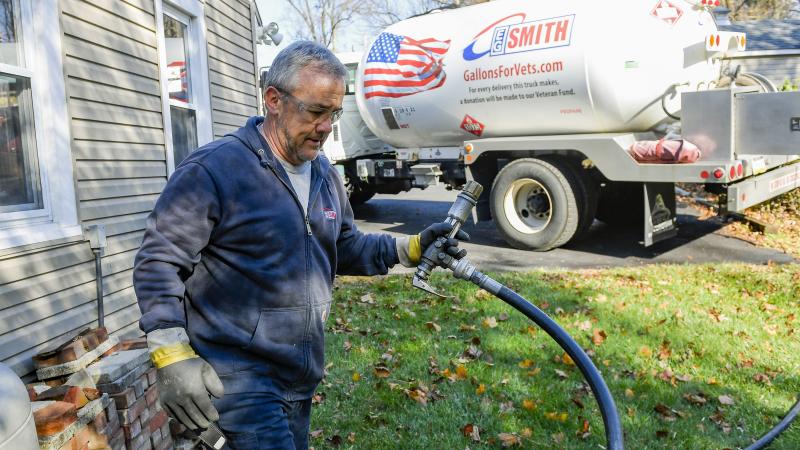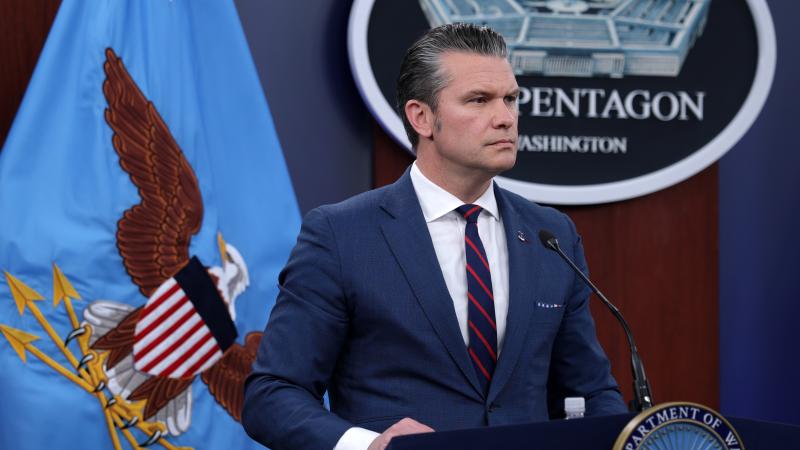Biden LNG election gamble won supporters and angered critics, but will it ultimately pay off?
During his campaign, Biden promised to "end fossil fuels," but the U.S. is producing more than ever. With the stroke of a pen, Biden won back the hearts and minds of many unhappy climate activists by showing his war on fossil fuels wasn’t all talk.
President Joe Biden's decision to block the Department of Energy from issuing permits to export liquified natural gas (LNG) was a political risk. He pledged to “end fossil fuel” during his campaign, and there’s a long list of actions he and the Democrats took to make good on that promise.
Despite those efforts, the United States produces more fossil fuels every year than any other nation in history, and the U.S. was the largest exporter of LNG in 2023.
The disconnect between Biden’s anti-fossil fuel rhetoric and the country’s historic production was threatening to undermine support for his reelection campaign. With the stroke of a pen, Biden won back the hearts and minds of many unhappy climate activists by showing his war on fossil fuels wasn’t all talk.
“President Biden and Secretary Granholm’s bold step today continues this administration’s historic efforts to meet the global commitment to phase out fossil fuels and confront the climate crisis head on,” Sierra Club Executive Director Ben Jealous said in a statement on the LNG pause.
“Joe Biden did something remarkable, and almost without precedent – he actually said no to big oil,” Bill McKibben, founder of the anti-fossil fuel nonprofit Third Act, wrote in The Guardian.
The policy, however, has angered many others, particularly those with a stake in the continued use of fossil fuel. A coalition of 16 red states led by Louisiana Attorney General Liz Murrill filed a lawsuit challenging Biden’s actions.
Most of those who weren’t happy with the decision weren’t going to vote for Biden anyway. But even some of Biden's allies have expressed concern. In 1988 Biden repeatedly lifted lines from a British politician’s speech and falsely said he had ancestors who worked as coal miners 12 hours underground.
Pennsylvania Gov. Josh Shapiro, told The Financial Times that he hopes the pause ends sooner than later. The 2024 swing state is the second largest gas-producer in the country after Texas, according to the FT, and it accounts for approximately 20% of the volume produced. A February poll showed 58% of the state’s voters opposed the LNG pause.
“This is critically important to our state,” Shapiro said in the FT interview.
There are a lot of farmers in Pennsylvania who aren’t happy with the pause due to the royalty payments they receive from the gas producers operating on the farmers’ land.
“They are now provided a source of revenue to expand their operations, or invest in new equipment or technologies, and sometimes just to save a farm on the brink,” Chris Herr, executive director of PennAg Industries Association, told American Greatness.
Screeching halt
Since it was announced, the LNG export block has been the topic of a few Congressional hearings. The latest was a House Energy and Commerce subcommittee field hearing in Port Arthur, Texas, where a terminal construction project is underway.
The LNG pause only affects new applications for LNG exports to nations without free trade agreements with the U.S., which includes European countries. Those permits are issued by the Department of Energy (DOE), whereas the terminal construction permits come from the Federal Energy Regulatory Commission (FERC). The pause only impacted new and pending applications for export permits.
While Biden’s policy doesn’t directly impact the construction of terminals, it does create regulatory uncertainty, which can impact these billion-dollar investments.
Port Arthur LNG is a two-phase LNG export terminal project. The first phase received its construction permits from FERC in April 2019, and then the DOE granted the project its export permits the following month. The second phase of the project, according to testimony at the field hearing, was brought to a “screeching halt” as a result of the pause.
“Their investors are now encountering a lot of uncertainty. This man will cost Southeast Texas thousands of jobs and hurt businesses that rely on projects like this,” Rep. Randy Weber, R-Texas, whose district includes Port Arthur, said at the hearing.
Port Arthur Mayor Thurman Bartie urged the Biden administration to reconsider the LNG export permit pause. Port Arthur, he said, is home to several petrochemical facilities, which provide employment and economic benefits to the port city.
“If the permitting is continued to be disallowed, the economic impact of businesses supplying materials and goods during this operation will harm families' abilities to continue with specific qualities of life,” Bartie said.
The representatives also heard from a witness who supported the pause. James Beard, founder and CEO of the Port Arthur Community Action Network, a nonprofit that works for “environmental justice,” said that despite the economic benefits of the area’s petrochemical industry, it was impacting the health of residents in the region. He accused the companies of acting in the “blind pursuit of profits,” which he said is “shameful and disturbing.”
“We in the Gulf sacrifice zone say enough is enough. We refuse to be sacrificed. We are a national interest. Enough is enough,” Beard said.
Rep. Morgan Griffith, R-Virgina, said that the coal mining industry in his district had many of its jobs eliminated as the country moved away from electricity generation from coal. The proponents of eliminating coal, he said, promised the employees who lost their jobs would find other jobs.
“Well, there are some other jobs but the job at the Dollar General just doesn't pay as much as the job in the coal mine with over $100,000 a year,” Griffith said.
Hidden allies
How much the forces of industry support or oppose the LNG pause might not be entirely straight-forward, however.
Doomberg, a team of advisors in the energy space who publish their analyses on Substack, explained in January that downstream industries — those that utilize natural gas as an input — are always looking for ways to secure lower costs.
Chemical industries, according to Doomberg, have been lobbying to limit exports of the large supply of natural gas that was unleashed in the U.S. as a result of the “Shale Revolution.” As the gas companies became awash with natural gas, they sought new markets. In 2016, the U.S. began allowing LNG to be exported. By the middle of 2017, the Industrial Energy Consumers of America (IECA), a lobby group for big chemical companies, sent a letter to Rick Perry, who was energy secretary under former President Donald Trump, asking him to put a halt on the buildout of LNG export terminals.
“The fact is that utilizing natural gas in manufacturing, as compared to exporting it, creates eight times more jobs, twice the direct value added per year and 4.5 times the direct construction jobs,” the IECA argued in the letter, which asked for a moratorium on further LNG export approvals.
Seven years later, Doomberg wrote, natural gas prices in the U.S. were still where they were in 2017 — under $3 per million British thermal units. Yet, the IECA was still pleading with the current energy secretary, Jennifer Granholm, to do something about LNG exports.
“This administration should ensure that its LNG policy protects U.S. consumers from the accelerating risks that come with increased LNG exports,” the ICEA wrote.
Whether or not all these competing interests will make the political risk Biden took executing the LNG pause worth it remains to be seen, but behind the scenes, Biden may have more allies rooting for it than just the climate activists in his base.
The Facts Inside Our Reporter's Notebook
Links
- end fossil fuel
- long list of actions
- more oil every year
- largest exporter of LNG in 2023
- undermine support for his reelection campaign
- said in a statement on the LNG pause
- Third Act
- wrote in the
- Guardian
- coalition of 16 red states
- werenât going to vote for Biden anyway
- he had ancestors who worked as coal miners
- told the Financial Times
- 58% of the stateâs voters opposed the LNG pause
- told American Greatness
- been the topic
- few Congressional hearings
- subcommittee field hearing
- Port Arthur LNG
- Port Arthur Community Action Network
- Doomberg
- explained in January
- Shale Revolution
- the U.S. began allowing LNG to be exported
- asking him to put a halt on the buildout of LNG export terminals
- pleading with the current energy secretary
















